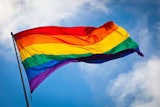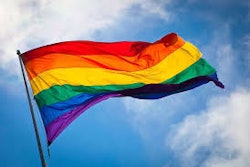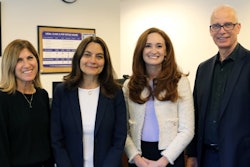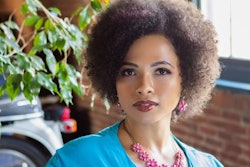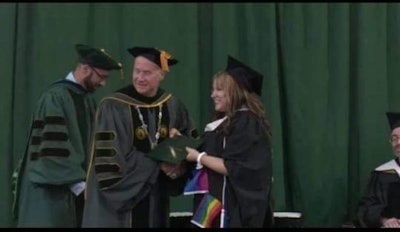 A screenshot of the moment Samantha Lynn Motto walked across the stage wearing her pride gear. This moment was later edited out from the official video shared by the school.
A screenshot of the moment Samantha Lynn Motto walked across the stage wearing her pride gear. This moment was later edited out from the official video shared by the school.
“Men cannot become women, only better or ‘badder’ men,” said Kreeft.
Motto understood Kreeft’s quote as a reference to transgender people.
“Everyone laughed. The whole crowd laughed. They really don’t think [LGBTQ+] exist here in this space,” said Motto. “So, I was like, there’s about to be a big uncomfortable truth coming at you right now. The cold feet got real hot, real quick. I was ready.”
When her name was called for earning a Master of Arts in Clinical Mental Health Counseling, Motto followed through with her plan. She pulled a scrunchie on her left wrist. On it, she had sewn two flags representing bisexual and LGBT pride. They waved at her side as she walked across the stage and accepted her degree.
For those physically in attendance, and those watching the livestream, Motto’s flags were seen, and her accomplishments celebrated. But hours later, when Franciscan uploaded the livestream recording to its website, Motto discovered that she had been edited out. While the rest of her 2022 graduating class crosses the stage, the video cuts at one hour and 29 minutes, as though Motto, and her statement, were never there.
Franciscan University did not respond to multiple requests for comment.
For many students attending institutions, particularly some Christian institutions, where queerness and transness are explicitly forbidden, graduation can be a moment to take ownership of their personal truths. The boldness of the moment is not unrecognized by queer scholars.
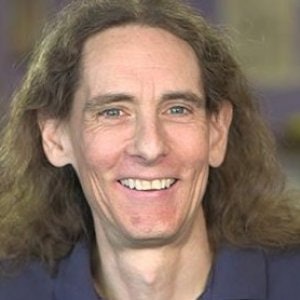 Dr. Genny Beemyn, director of the Stonewall Center at the University of Massachusetts, Amherst, and coordinator of the Campus Pride’s Trans Policy Clearinghouse.
Dr. Genny Beemyn, director of the Stonewall Center at the University of Massachusetts, Amherst, and coordinator of the Campus Pride’s Trans Policy Clearinghouse.
“We know from research that the climate at [conservative Christian institutions] is very negative for LGBTQ+ students. They experience a much more negative campus climate than at nonreligious secular colleges,” said Beemyn. These acts of graduation pride “show that times are changing, and students who are part of religious traditions that are historically conservative are becoming more accepting and more inclusive of LGBTQ+ people.”
Title IX protects students from discrimination for race, sex, religion, and sexual identity, but religious institutions are exempt from these qualifications. According to a 2021 Gallup poll, one in six individuals in Generation Z identify as LGBTQ+. As Generation Z heads to college, scholars worry about the mental and physical health of queer students in conservative environments.
“You don’t have to come out to lead happy, healthy lives. But on the other hand, folks who have to hide who they are for survival is a very different matter,” said Beemyn. “Just imagine the difficulties of having to hide a very basic part of who you are from a residence hall roommate, from friends you don’t know will be supportive—that takes quite a toll on someone’s mental health and self-esteem.”
Beemyn, who conducted a 2015 study which addressed why queer students might attend conservative Christian universities, found that the answer varied.
“For some, it was not recognizing that they were LGB until they got to college. Some prioritized their religious state over their sexuality. There were expectations from family that they would attend, and they didn’t feel they had a lot of choice.” said Beemyn.
Sometimes, Beemyn added, students attend these institutions because of the negative, internalized view of homophobia they have. They enroll with hopes that the institution can “cure” them.
In Motto’s case, her first introduction to Franciscan happened when she was 15 years old. She believed that going to their institution would improve her soul and make her more ready for heaven. By the time she made it to graduate school, her feelings had changed somewhat. But her husband worked in a job on the school’s campus, and consequently, her tuition came at very little cost. Motto made the choice to attend so she could graduate mostly debt free.
In 2009, when she first enrolled as an undergraduate, Motto said she shut down any attraction she felt to women. She became laser-focused on the fact that she was also attracted to men. Through years of counseling since then, she has grown to love and accept the fact that she is bisexual. While the journey has led her to question some aspects of Catholicism, her faith has remained strong.
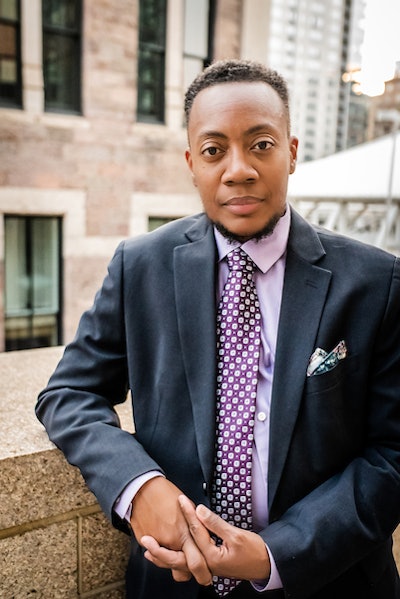 Dr. D-L Stewart, professor and chair of the higher education department at the University of Denver.
Dr. D-L Stewart, professor and chair of the higher education department at the University of Denver.
“It’s erasure of bisexuality as a valid and legitimate way of being and showing up in the world, and this actual literal erasure of bisexuality in the college space strikes me as very, very telling,” said Stewart. “What this student dared to do was to refuse to be silenced, made invisible. And the university said, ‘Oh no, we will hide you.’”
Stewart added that the institution not only removed her from the video but removed any chance of her sharing that moment with someone unable to attend or view that day.
“So, there’s that very personal and direct impact of knowing that your university can’t even tolerate your existence. But there’s also the signal that that sends to other students who are there, because by no means is she the only one there,” said Stewart.
Motto confirmed this. In fact, she first came out to a group of students on a text chain, voicing her frustration at micro-aggressions she felt she was experiencing in a classroom. To her surprise, that text jump-started a group text of other queer-identifying students at Franciscan.
For students who seek counseling at Franciscan for their same-sex attractions, the school website guides them to two resources: the Eden Initiate and Courage. Both are communities of Catholic individuals who identify as LGBTQ+ and accept themselves, but still see the actualized relationships between queer people as a sin in the eyes of God and are therefore celibate. These kind of programs are what Beemyn calls a “hate the sin, love the sinner” approach.
But it’s not a standard for Catholic institutions. Gonzaga University, in Spokane, Washington, is a Jesuit school, but its Lincoln LGBTQ+ Resource Center has been in existence for almost 20 years.
Joan Iva Fawcett, dean of social justice leadership and community empowerment at Gonzaga, helps to manage and oversee the events, panels, and trainings they coordinate, including the hiring of a director this summer.
“There’s a Jesuit term, cura personalis, development of a whole person,” said Fawcett, adding that the Gonzaga mission statement includes a line about developing a person mentally, physically, spiritually, emotionally, and culturally. “There’s a queer culture, a queer community. It’s really looking at all the identities that make up a person, not just acknowledging but affirming. And making sure that students, faculty, and staff feel safe, affirmed, and welcomed on this campus.”
While Fawcett admits that her institution isn’t perfect and is actively looking for ways to improve, the mission of fully embracing the student for the “greater human dignity” is what drives them.
For Motto, her forced time in the closet has come to an end. But the internalized homophobia she learned will likely take years of hard work to undo, she said. To those LGBTQ+ students who are struggling with their identity in spaces where they feel unsafe or unable to come out, she wants them to know they are not alone.
“We’re all human. You’re just as lovable and worthy as anyone else, you deserve to take up space, to exist,” Motto paused, her eyes filled with tears. “It’s just sad because I know… for a lot of queer people, it’s not enough. To be somewhere like that for four years—in my case, seven years—it takes a toll. There’s a part of me that wants to say don’t do it, it’s not worth the price you’ll pay.”
Liann Herder can be reached at [email protected].

